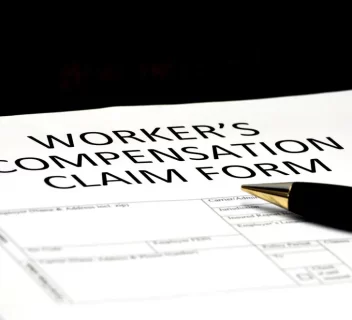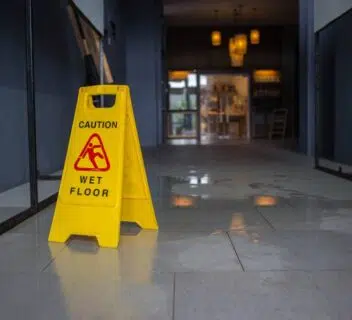Most Common Workplace Injuries
If you’ve been injured in the workplace, or simply while on-the-job but not at a work site, then you could be entitled to compensation for common work-related injuries in the form of workers’ compensation benefits, or damages through a lawsuit.
That being said, workplace injury disputes aren’t necessarily straightforward. Many complications, challenges, and opportunities can arise over the course of the dispute, and a skilled personal injury attorney will understand how to navigate these aspects as they come up. And if you’ve sustained one of the most common workplace injuries, then there’s a clear strategic path to arguing for your losses in a medical and occupational sense.
Read on to learn more!
What are the top 5 common injuries in the workplace?
The most common workplace injuries are as follows:
- Exposure to harmful substances or environments
This became particularly common during the Covid pandemic and has remained high on the list. Injury and illness due to viral infection, chemical exposure, and various other hazards fall under this category. It is crucial to take proper precautions to prevent electrocution and other injuries in hazardous environments.
- Overexertion, bodily reaction
Stress on the body is a serious issue and can cause lifelong health impacts if employees are not adequately taken care of. Hectic work schedules and poor management can lead to employees overexerting themselves and sustaining a variety of injuries, such as back and neck injuries. It’s important to take regular breaks so that any repetitive work doesn’t put a strain on your body parts. The use of mechanical lifting equipment is essential to prevent overexertion and muscle strains, especially when lifting heavy objects. This is one of the most common causes of repetitive motion injuries, such as carpal tunnel syndrome.
- Slips, trips, and falls
These types of accidents have always featured among the most common workplace injuries. Even in an “office” environment, a slip and fall injury can occur if there are liquid spills, poor lighting, or other problematic hazards around the work premises. It could be exacerbated by a failure to wear proper footwear, or by wearing loose clothing. That being said, a slip and fall injury is much more likely to occur in a labor-intensive job, such as a warehousing job or at a construction site. Proper safety measures, such as wearing seat belts and providing fall protection, are crucial to prevent these incidents. These incidents can lead to serious injuries such as broken bones and head trauma.
- Contact with objects and equipment
Injuries due to falling heavy objects, flying objects, tool-related injuries, and others affect many employees across America. For example, if you sustained a contact injury while working at a warehouse (i.e., crates fell on your legs and caused serious injury), then you could be entitled to workers’ compensation benefits, or even damages through a lawsuit depending on the circumstances. The use of personal protective equipment (PPE) is vital to prevent injuries from falling or flying objects.
- Violence and other injuries by persons or animals
Unfortunately, other people can pose a danger in the workplace, and their violence is a common work related injury. For example, if you and a coworker have interpersonal conflicts, they could try to lash out at you in the workplace by throwing a punch. Those sorts of injuries are among the most common workplace injuries, in fact. Workplace violence, including physical altercations and threats, is a significant source of injuries in this category.
This may come as a surprise — motor vehicle injuries due to transportation incidents don’t break the top five list for types of injuries common in the workplace! They clock in at number six, with 85,000 injuries across all industries on an annual basis, according to a report conducted by the National Safety Council).
Which industry has the highest rate of workplace injuries?
It depends on how you measure the data. The four most dangerous industries (according to reports conducted by the National Safety Council) are as follows:
- construction;
The most workplace fatalities on an annual basis
- education and health services;
The most nonfatal injuries and illnesses involving days away from work
- agriculture, forestry, fishing and hunting;
The most workplace fatalities per 100,000 workers
- transportation and warehousing.
The highest injury and illness rate per 10,000 workers
These industries are particularly prone to occupational injuries, including musculoskeletal disorders and repetitive stress injuries. Various types of workplace accidents can occur in these industries, such as entanglement, being struck by or caught in moving machinery, vehicle-related accidents, fire and explosions, and overexertion injuries.
If you are involved in any of these industries, chances are that you’ve either personally experienced a workplace accident, or know of someone who has. That being said, many employees in these industries are not aware of their rights under the law — and as a result, they could be missing out on compensation that they’re entitled to receive. That’s why awareness is so important!
Workers in these industries are also at risk of severe injuries, such as those affecting the ears, eyes, and respiratory systems.
What does OSHA consider a serious injury in terms of occupational safety?
OSHA has a rather straightforward definition of a “serious injury.” Simply put, your injury is considered serious if it:
- Resulted in amputation;
- Resulted in any form of in-patient hospitalization; and/or
- Resulted in the loss of an eye.
Traumatic brain injuries (TBI) are also considered serious injuries by OSHA, often resulting from falls or head trauma.
What is workers’ compensation?
Workers’ compensation is a form of “required insurance” that is meant to protect both employees and employers in different ways and is meant to make the claims process more efficient after a workplace accident. Workers’ compensation benefits cover a wide range of injuries occurring at or resulting from employment.
Essentially, certain employers are required by law to invest in workers’ compensation insurance. This covers all qualified employees within the organization. When one of these qualified employees gets injured in a workplace accident, the workers’ compensation insurance company has to pay out benefits to cover the employee’s losses. Whether it’s an occupational injury like overexertion or a construction-related accident, workers’ compensation aims to provide necessary benefits.
Workers’ compensation is beneficial for both employees and employers. For employees, it helps them to access benefits in a straightforward manner without having to worry about navigating the complexities of litigation. For employers, it helps them avoid lawsuits because it restricts the injured employee (in most circumstances) from suing them for damages.
Pros and cons of workers’ compensation
Pros
- You don’t have to establish liability to get a payout. In other words, your employer doesn’t have to be “at fault” for you to be compensated. As someone who is qualified to receive workers’ compensation benefits, you can obtain those benefits so long as you’re injured on-the-job and are not complicit in your own injuries.
- The process of obtaining workers’ compensation benefits tends to be simpler than the traditional litigation process, which can be comprehensive and resource-intensive.
- Workers’ compensation benefits are designed to cover a variety of work-related injuries, ensuring that employees receive necessary medical care and financial support.
Cons
- Workers’ compensation benefits don’t cover all damages that you might have sustained due to the injury. For example, they don’t cover pain and suffering damages, which often constitute a substantial portion of the overall compensation in a standard lawsuit. As such, your payout will likely be less than the “ideal” payout if you were to sue.
- You might not have a choice to avoid workers’ compensation and sue. If you qualify for workers’ compensation, then one of the restrictions is that you cannot sue your employer for the same claim. Thus, your strategic options might be quite limited.
Some of the “cons” can be avoided with the help of an experienced workplace injury lawyer who understands how to navigate these types of disputes. For example, if you have a strong case and could benefit from bringing a lawsuit (instead of securing a workers’ compensation payout), then your attorney can try to argue that you’re not a qualified employee, or they could argue that your employer engaged in reckless or intentional misconduct, thus giving you the right to sue them directly.
If I don’t have any money, how can I afford a personal injury lawyer?
It’s totally alright if you don’t have any money — in fact, as the injured plaintiff, you can afford to hire a legal representative (i.e., an experienced personal injury attorney) with zero dollars in your bank account! That’s because most plaintiffs’-side personal injury attorneys work on a contingency fee basis.
In other words, the attorney doesn’t get paid until and unless they secure compensation on your behalf — if you receive compensation (i.e. if you “win” a payout), then they will take a percentage cut of that amount. This can range anywhere from 25 percent at the low end to 40 percent or more at the high end.
If you don’t win any compensation, you don’t have to pay anything. This dynamic substantially lowers the barrier to entry for getting legal representation. It also incentivizes attorneys to work efficiently and effectively, and to maximize your compensation — after all, the more you get paid, the more they get paid.
So don’t worry about whether you can “afford” a workplace injury attorney. Anyone can, since there are no upfront or out-of-pocket costs.
Contact 1-800-THE-LAW2 for a Free Legal Consultation
If you’ve been injured in the workplace, then you could be entitled to sue and recover damages as compensation. Navigating the legal process isn’t always simple or straightforward, however, especially in the workplace injury context — where you have to evaluate your qualification for workers’ compensation benefits, and determine whether to explore alternative legal strategies to circumvent workers’ compensation restrictions. That’s why it’s important to consult an experienced personal injury lawyer for guidance.
Contact 1-800-THE-LAW2 for a free legal consultation with one of the skilled personal injury lawyers in our network. During this initial consultation, you’ll have the opportunity to discuss your case in detail and learn more about what your options are as you move forward with litigation. If you decide against a lawsuit, that’s okay too — there’s no obligation to continue at any point. So pick up the phone and call us today to get started.
We look forward to assisting you.




